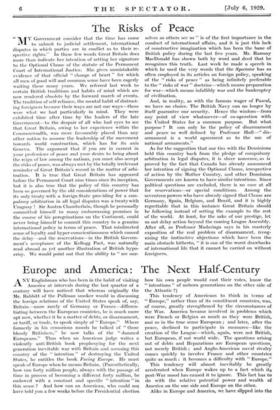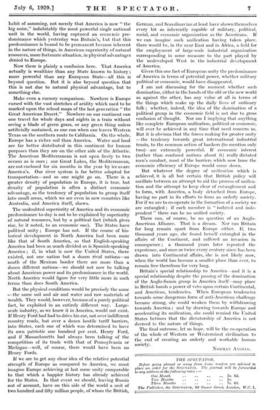Europe and America:
The Next Half-Century ANY Englishman who has been in the habit of visiting America at intervals during the last quarter of a century will have noticed that whereas originally the Mr. Babbitt of the Pullman smoker would in discussing the foreign relations of the United States speak of, say, Britain—more rarely of Germany or France—differen- tiating between the European countries, he is much more apt now, whether it be a matter of debts, or disarmament, or tariff, or trade, to speak simply of " Europe." Where formerly in his censorious moods he talked of "those bloody Britishers," he now talks of the "damned Europeans." Thus when an American judge writes a violently anti-British book prophesying for the next generation inevitable war with Britain and accusing this country of the " intention " of destroying the United States, he entitles the book Facing Europe. He must speak of Europe when he means Britain. (Parenthetically, how can forty million people, always with the passage of time in process of becoming a different forty million, be endowed with a constant and specific "intention "in this sense ? And how can an American, who could not have told you a few weeks before the Presidential election how his own people would cast their votes, know the " intentions " of unborn generations on the other side of the Atlantic ?) This tendency of Americans to think in terms of "Europe," rather than of its constituent countries, was, of course, greatly strengthened by the circumstances of the War. America became involved in problems which were French or Belgian as much as they were British, and so in the true sense European ; and later, after the peace, declined to participate in measures—like the creation of the League—which, again, were not British, but European, if not world wide. The questions arising out of debts and Reparations are European questions, not merely British ; and Anglo-American naval rivalry comes quickly to involve France and other countries quite as much : it becomes a difficulty with "Europe."
This tendency will almost inevitably be greatly accelerated when Europe wakes up to a fact which its post-War mood has caused it to ignore. This fact has to do with the relative potential power and wealth of America on the one side and Europe on the other.
Alike in Europe and America, we have slipped into the habit of assuming, not merely that America is now "the big noise," indubitably, the most powerful single national unit in the world, having captured an econcmic pre- dominance which yesterday was Britain's, but that this predominanee is bound to be permanent because inherent in the nature of things, in American superiority of natural resources, more fortunate situation, in physical advantages denied to Europe.
Now there is plainly a confusion here. That America actually is wealthier than any State known to history ; more powerful than any European State—all this is beyond question. But it is also beyond question that this is not due to natural physical advantage, but to something else.
Make even a cursory comparison. Nowhere is Europe cursed with the vast stretches of aridity which used to be marked upon the school maps of the last generation "the Great American Desert." Nowhere on our continent can one travel for whole days and nights in a train without seeing a blade of green grass, or any green thing unless artificially sustained, as one can when one leaves Western Texas on the southern route to California. On the whole, Europe has a richer soil than America. Water and land are far better distributed in this continent for human purposes than they are on the other side of the Atlantic. The American Mediterranean is not open freely to two oceans as is ours ; our Great Lakes, the Mediterranean, are not enclosed for six months in the year by ice as are America's. Our river system is far better adapted for transportation—and so one might go on. There is a greater density of population in Europe, it is true, but density of population is often a distinct economic advantage, as the tendency of population to group itself into small areas, which we see even in new countries like Australia, and America itself, shows.
The undoubted superiority of America and its economic predominance to-day is not to be explained by superiority of natural resources, but by a political fact (which gives rise, be it noted, to an economic one). The States have political unity ; Europe has not. If the course of his- torical development in North America had been more like that of South America, so that English-speaking America had been as much divided as is Spanish-speaking America ; if, in what is now the United States, there existed, not one nation but a dozen rival nations—as south of the Mexican border there are more than a dozen different nations—we should not now be talking about American power and its predominance in the world. North America would figure for very little more in such terms than does South America.
But the physical conditions would be precisely the same —the same soil and air and water and raw materials of wealth. They would, however, because of a purely political fact, be exploited in an entirely different way. Large- scale industry, as we know it in America, would not exist. If Henry Ford had had to drive his car, not over indifferent country roads, but over a dozen hostile tariff barriers, into States, each one of which was determined to have its own patriotic one hundred per cent. Henry Ford, and if, Massachusetts had always been talking of the competition of its trade with that of Pennsylvania or Michigan—well, of course, there would have been no Henry Fords.
If we are to get any clear idea of the relative potential strength of Europe as compared to America, we must imagine Europe achieving at last some unity comparable to that which a happier history has already achieved for the States. In that event we should, leaving Russia out of account, have on this side of the world a unit of two hundred and fifty million people, of whom the British, German, and Scandinavian at least have shown themselves every bit as inherently capable of military, political, social, and economic organization as the Americans. If we can imagine such unification having taken place, there would be, in the near East and in Africa, a field for the employment of large-scale industrial organization corresponding in some measure to the part played by the undeveloped West in the industrial development of America.
Given this one fact of European unity the predominance of America in terms of potential power, whether military political or economic, would have disappeared.
I am not discussing for the moment whether such domination, either in the hands of the old or the new world as against the other, has any value at all in terms of the things which make up the daily lives of ordinary folk ; whether, indeed, the idea of the domination of a political group in the economic field is not due to gross confusion of thought. Nor am I implying that anything like complete European unification, political or economic, will ever be achieved in any time that need concern us. But it is obvious that the forces making for greater unity —the tendency towards great international industrial trusts, to the common action of bankers (to mention only two)— are extremely powerful. If economic interest (rather than confused notions about it) really dictated men's conduct, most of the barriers which now lame the economic efficiency of Europe would come down.
But whatever the degree of unification which is achieved, it is all but certain that British Volicy will oscillate between an attempt to aid the process of unifica- tion and the attempt to keep clear of entanglement and to form, with America, a body detached from Europe, having no part in its efforts to form an orderly society. For if we are to co-operate in the formation of a society we are entangled ; if each member is "isolated and inde- pendent" there can be no unified society.
There can, of course, be no question of an Anglo- American Alliance. That is a dream. Nor can Britain for long remain apart from Europe either. If, two thousand years ago, she found herself entangled in the affairs of the Continent, and suffered an invasion in consequence ; a thousand years later repeated the experience, and once or twice every century since has been drawn into Continental affairs, she is not likely now, when the world has become a smaller place than ever, to remain free therefrom for very long.
Britain's special relationship to America—and it is a special relationship despite the passing of the domination of the Anglo-Saxon group in America itself—may place in British hands a power of veto upon certain Continental, and American, tendencies. When European tendencies towards some dangerous form of anti-American challenge became strong, she could weaken them by withdrawing towards America ; and by drawing towards Europe and accelerating its unification, she could remind the United States betimes that the dictatorship of America is not decreed in the nature of things.
The final outcome, let us hope, will be the co-operation of the whole of Western or Westernized civilization to the end of creating an orderly and workable human society. NORMAN ANGELL.











































 Previous page
Previous page